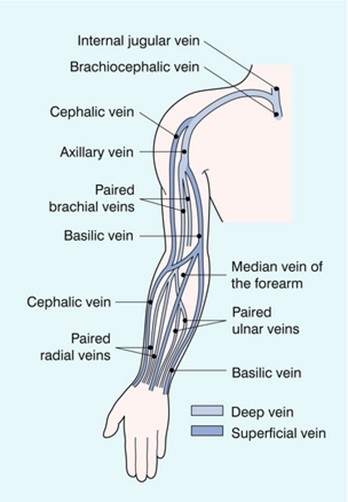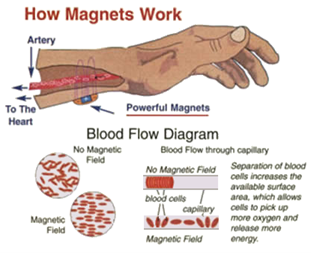A nurse is preparing to insert an IV catheter for a client following a right mastectomy. Which of the following veins should the nurse select when initiating IV therapy?
The cephalic vein on the back of the right hand
The radial vein on the left wrist
The basilic vein in the right antecubital fossa
The cephalic vein in the left distal forearm
The Correct Answer is C
Choice A reason:
The cephalic vein on the back of the right hand is incorrect because it might still involve the same arm as the mastectomy site, and it is important to avoid this side.
Choice B reason:
The radial vein on the left wrist is incorrect because it is not on the opposite side of the mastectomy and could increase the risk of lymphedema.
Choice C reason:
The basilic vein in the right antecubital fossa is the appropriate answer. When inserting an IV catheter for a client who has undergone a right mastectomy, it is generally advisable to avoid the arm on the same side as the mastectomy due to the risk of lymphedema and impaired lymphatic drainage. The basilic vein in the right antecubital fossa (the inner bend of the right elbow) would be a suitable choice in this case, as it is on the opposite side of the mastectomy.
Choice D reason:
The cephalic vein in the left distal forearm is on the same side as the mastectomy and should be avoided to reduce the risk of complications.

Nursing Test Bank
Naxlex Comprehensive Predictor Exams
Related Questions
Correct Answer is A
Explanation
Choice A reason
The client has an implanted defibrillator is the correct answer. Magnet therapy involves the use of magnets to alleviate pain and promote healing. However, it is contraindicated for individuals with implanted electronic devices, such as pacemakers or defibrillators, as the magnetic field could potentially interfere with the functioning of these devices. The safety of using magnet therapy with implanted devices has not been established, and caution is advised.
Choice B reason:
Allergic to penicillin is incorrect. Allergies to penicillin or other substances are not related to the use of magnet therapy.
Choice C reason:
The history of alcohol use disorder is incorrect. A history of alcohol use disorder does not directly contraindicate the use of magnet therapy.
Choice D reason:
The prescription for metoprolol is incorrect. Metoprolol is a common medication used to treat various conditions, including hypertension and certain heart conditions. It is not a contraindication for magnet therapy.

Correct Answer is A
Explanation
Choice A reason:
The client has expressed a lack of understanding about the procedure, which indicates that they may not have received sufficient information or clarification. It is important to notify the provider so they can ensure the client fully understands the procedure before giving informed consent.
Choice B reason:
The nurse should provide basic information and answer questions within their scope, but detailed explanations about the procedure are best provided by the provider who is performing the surgery.
Choice C reason:
While brochures can be helpful, they do not replace the need for direct, clear communication with the healthcare provider about the specific details of the surgery.
Choice D reason:
An incident report is not necessary in this context as the situation is related to informed consent and not an error or safety issue.
Whether you are a student looking to ace your exams or a practicing nurse seeking to enhance your expertise , our nursing education contents will empower you with the confidence and competence to make a difference in the lives of patients and become a respected leader in the healthcare field.
Visit Naxlex, invest in your future and unlock endless possibilities with our unparalleled nursing education contents today
Report Wrong Answer on the Current Question
Do you disagree with the answer? If yes, what is your expected answer? Explain.
Kindly be descriptive with the issue you are facing.
